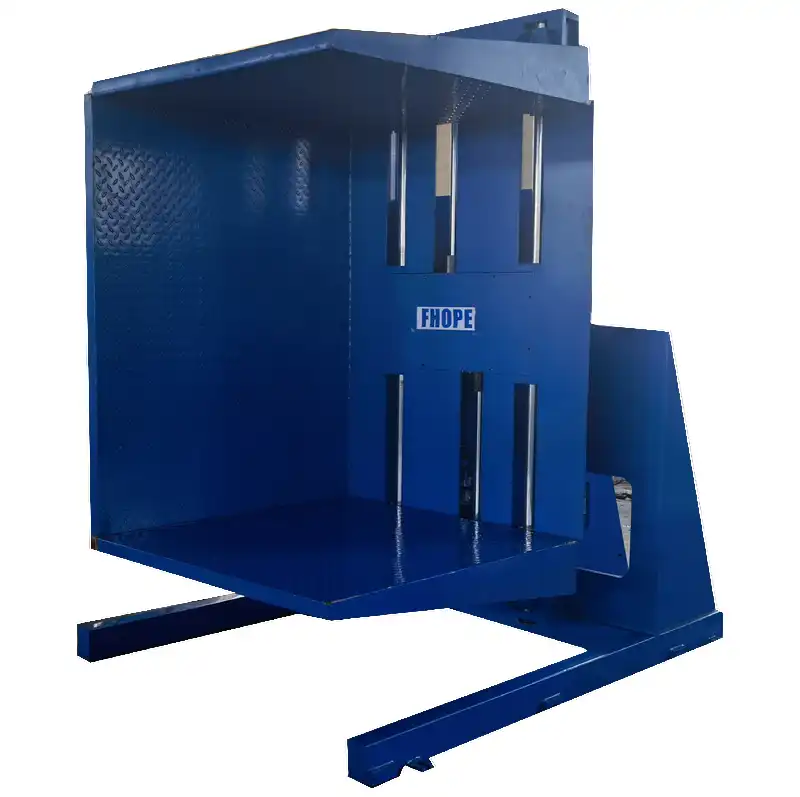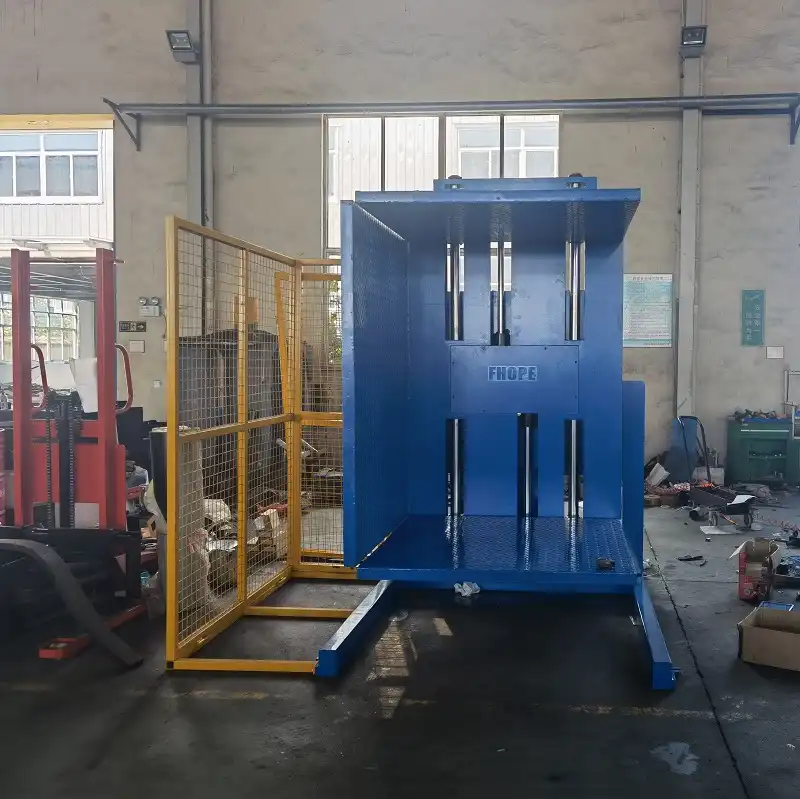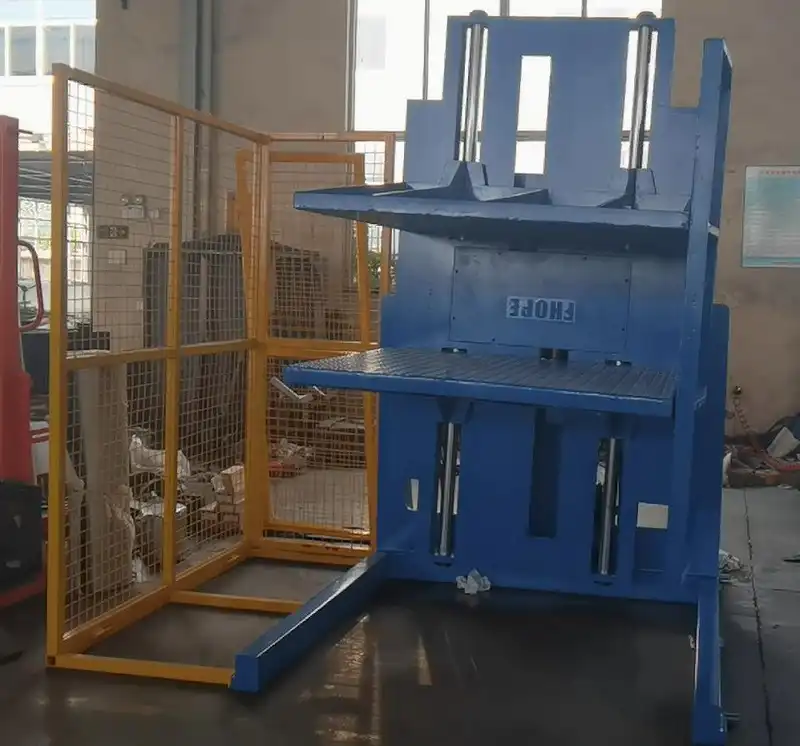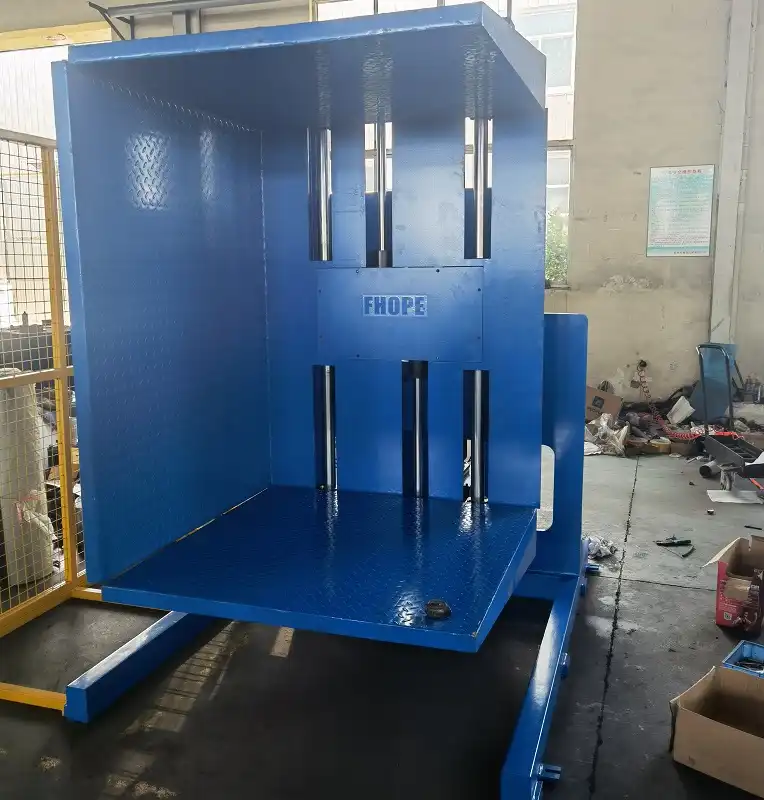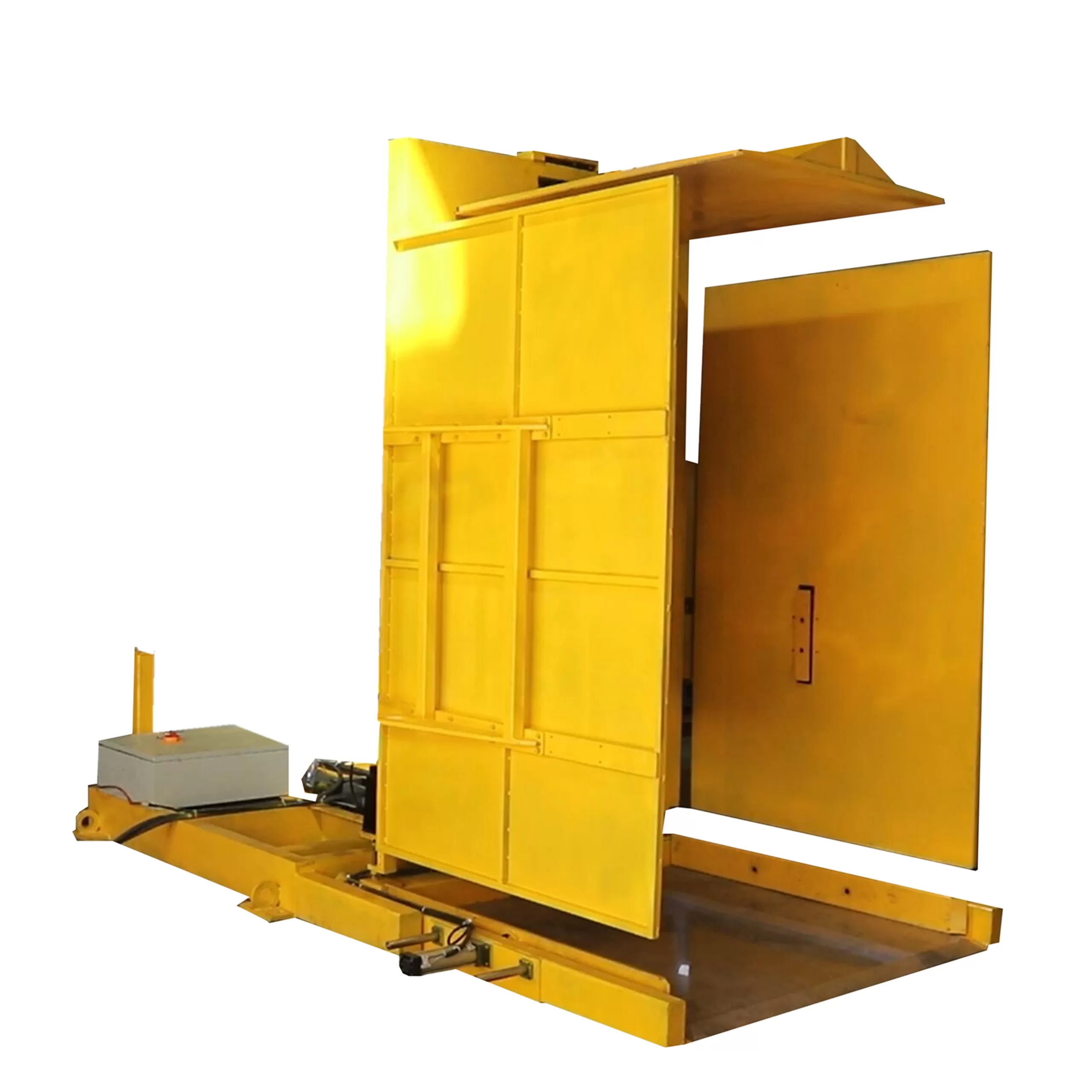Pallet Inverter with two clamper Heave laoding 2T
This is a 180°Pallet Inverter that includes two clampers for holding the pallet load from 800-1800mm. That made for heavy loading upto 2T. The pallet loading and unloading by fork lifter. By inverting the product 180 degrees, the pallet can be changed from top side.
Two-clamper pallet inverters are designed to securely grip the pallet from both sides and rotate it 180 degrees, effectively turning the pallet and its load upside down.
This type of pallet inverter is typically used in industries such as food and beverage, pharmaceuticals, and manufacturing where products need to be flipped for storage, transportation, or processing. They can help reduce the risk of injury and damage to products during handling and are often designed to be used with a range of pallet sizes and weights.
Model: FPFZ-C02
Specifications : Length (1000-1200) x Weight(1000-1200)mm
Height: 800-1800mm
Turnover Capacity (T): 2.0T
Turnover Time: Approx (S)25-35
Turnover Angle: 180°
Turnover Body BaseProfile Welding(A3 Steel)
Fixed Mode: By bolt
Operation: ModePanel control/ Wireless Remote Control
Motor PowerAA: Approx (Kw)5.5KW
Power Supply: 380v,50/60hz, 3phase
Machine size: App. L2200mm x W1450mm x H2000mm
Is Your Warehouse Operation Too Slow? How Pallet Inverter with Two Clamper Boost Efficiency
In today's fast-paced logistics and warehousing environments, efficiency is a key driver of success. The faster goods move through a warehouse, the more profitable and productive the operation becomes. Yet, many businesses struggle with slow pallet handling processes, which can significantly affect output and result in delays. One effective solution to this problem is the pallet inverter with two clamper—a machine that can dramatically boost efficiency in pallet transfers, rotations, and handling tasks.
In this article, we will explore the role of the pallet inverter with two clamper in warehousing operations, examining how it enhances efficiency, reduces downtime, and creates safer working conditions. We’ll dive into the specifics of how this technology works, its unique benefits, and how it can transform your warehouse into a more agile, productive operation.
1. The Basics of a Pallet Inverter with Two Clamper
Before we look at how a pallet inverter with two clamper can improve warehouse efficiency, it’s essential to understand what this machine is and how it functions. A pallet inverter is a device used to rotate or flip pallets and their loads, typically by 180 degrees. It is a highly effective tool when pallets need to be swapped, inspected, or repalletized for various logistical reasons.
The two clamper system adds an additional layer of efficiency and control. It ensures that the load is clamped from two sides during the inversion process, providing greater stability and security. This dual-clamp feature is particularly beneficial when handling fragile goods or pallets with uneven loads, as it minimizes the risk of load shift or damage during the flipping process.
With these two critical features—pallet rotation and dual clamping—this technology not only speeds up pallet handling but also reduces the need for manual labor, minimizes product damage, and ensures a smoother operational workflow.
2. Why Warehouse Operations Become Sluggish
Warehousing operations can often suffer from inefficiencies that slow down the entire supply chain. Here are some of the common reasons why operations lag:
A. Manual Labor Dependency
One of the main causes of slow operations is a reliance on manual labor for pallet handling. Employees manually rotating, lifting, or repalletizing goods is not only time-consuming but also physically demanding, leading to worker fatigue and lower productivity.
B. Frequent Pallet Transfers
In many warehouses, pallets frequently need to be swapped or goods transferred from one pallet to another due to reasons like damaged pallets or hygiene requirements. Manual repalletizing can introduce bottlenecks, especially when multiple pallets need to be inspected or replaced quickly.
C. Product Damage and Rework
When pallets are handled manually, there is a higher risk of product damage. Workers may mishandle or drop goods during pallet swaps, leading to rework and delays in the supply chain. This not only slows down operations but also increases costs.
D. Handling of Fragile or Delicate Products
Operations involving fragile goods can be even slower. Workers are required to exercise extra caution, making manual handling tasks more time-consuming. This can further impact warehouse efficiency, especially when large volumes of fragile items are involved.
All these factors contribute to operational inefficiency and can be significantly addressed by integrating pallet inverters with dual clamping mechanisms into the workflow.
3. How a Pallet Inverter with Two Clamper Improves Efficiency
The pallet inverter with two clamper is a game-changing tool that directly tackles the inefficiencies outlined above. Here’s how this technology can accelerate warehouse operations:
A. Speeding Up Pallet Swapping
Pallet inverters can automate the process of pallet swapping, eliminating the need for manual lifting and repalletizing. The two clamper system securely holds the load in place, allowing the inverter to flip it with precision and speed. In warehouses where damaged or non-compliant pallets need to be replaced, this process can save significant time, boosting productivity across the entire operation.
B. Reducing Labor Intensity
By automating pallet rotations and swaps, the pallet inverter dramatically reduces the need for manual labor. Workers no longer need to physically lift or rotate heavy loads, which in turn reduces the risk of injury and worker fatigue. This allows employees to focus on more value-added tasks rather than repetitive, labor-intensive pallet handling.
C. Protecting Goods from Damage
The dual clamping mechanism ensures that the load is held securely and safely during the inversion process. This minimizes the risk of products shifting or falling during pallet transfers, which is especially important when handling delicate goods such as electronics, food items, or pharmaceuticals. Reduced product damage means less rework, saving both time and resources.
D. Minimizing Downtime
In warehouses, downtime can be costly. Every minute spent manually handling pallets is time lost from fulfilling orders or processing shipments. With a pallet inverter, downtime is reduced as the process becomes faster and more streamlined. This means that warehouse operations can continue uninterrupted, ensuring goods are moved quickly through the supply chain.
4. Specific Applications of Pallet Inverters with Two Clamper
The versatility of a pallet inverter with two clamper makes it useful in a wide range of industries and applications. Here are some specific scenarios where this technology shines:
A. Food and Beverage Industry
In the food and beverage sector, goods often need to be transferred between different types of pallets, such as moving from wooden pallets to hygienic plastic pallets for storage or transport. A pallet inverter can quickly swap pallets without disrupting the product load, improving food safety while keeping the workflow efficient.
B. Pharmaceutical Warehousing
Pharmaceutical products are often sensitive to contamination, requiring strict handling protocols. The pallet inverter allows for easy pallet swapping, ensuring that goods are transferred to clean, compliant pallets while maintaining the integrity of the load.
C. Retail and Consumer Goods
In retail warehousing, especially in high-demand seasons, pallet handling needs to be fast and efficient to keep up with consumer demand. A pallet inverter with two clamper speeds up the process of repackaging goods or replacing damaged pallets, ensuring that products get to market faster.
D. Cold Storage
In cold storage environments, goods such as frozen food or pharmaceuticals must be rotated regularly. Pallet inverters allow for easy stock rotation, helping to maintain inventory quality without damaging delicate goods in cold temperatures.
5. Key Benefits of Investing in a Pallet Inverter with Two Clamper
When considering whether to invest in a pallet inverter with two clamper, it's important to weigh the key benefits that this technology brings to warehouse operations:
A. Increased Throughput
By automating pallet handling tasks, a pallet inverter can significantly increase your warehouse’s throughput. Faster pallet rotations and transfers mean that goods move through the supply chain more quickly, helping you meet delivery deadlines and customer expectations.
B. Reduced Labor Costs
With fewer workers needed to manually handle pallets, labor costs are reduced. Workers can be redeployed to other tasks that require human judgment and expertise, improving overall productivity.
C. Enhanced Safety
The safety features of a pallet inverter—such as the two clamper system—help protect workers from injury by taking over the physically demanding task of flipping and rotating pallets. This leads to fewer workplace accidents and reduced workers' compensation claims.
D. Improved Product Handling
Delicate or fragile goods are less likely to be damaged during handling with a pallet inverter. The secure dual clamping mechanism ensures that loads remain stable, reducing the risk of product loss and enhancing quality control.
6. Choosing the Right Pallet Inverter for Your Warehouse
When selecting a pallet inverter for your warehouse, there are several factors to consider to ensure you’re making the right choice:
A. Load Capacity
Ensure that the pallet inverter you choose has the appropriate load capacity to handle the types of pallets and goods you process regularly. Overloading a machine can result in damage to both the goods and the equipment.
B. Customization Options
Look for a pallet inverter that offers customization options to suit your specific needs. Some models may offer adjustable clamping pressure, rotation speeds, or load heights, allowing you to fine-tune the machine for different types of goods.
C. Integration with Existing Systems
Ensure that the pallet inverter can be easily integrated with your existing warehouse systems, such as conveyor belts or automated guided vehicles (AGVs). Seamless integration will maximize efficiency and further streamline your operations.
Conclusion: Boost Efficiency with a Pallet Inverter with Two Clamper
If your warehouse operations are too slow or bogged down by inefficient pallet handling, a pallet inverter with two clamper could be the solution. By automating pallet rotation and transfer processes, this machine can help you reduce manual labor, increase throughput, and minimize product damage—all while enhancing worker safety.
For businesses looking to stay competitive in today’s fast-moving logistics landscape, investing in a pallet inverter with two clamper is not just a smart choice—it’s a necessary upgrade to keep your operations running smoothly, efficiently, and profitably.
